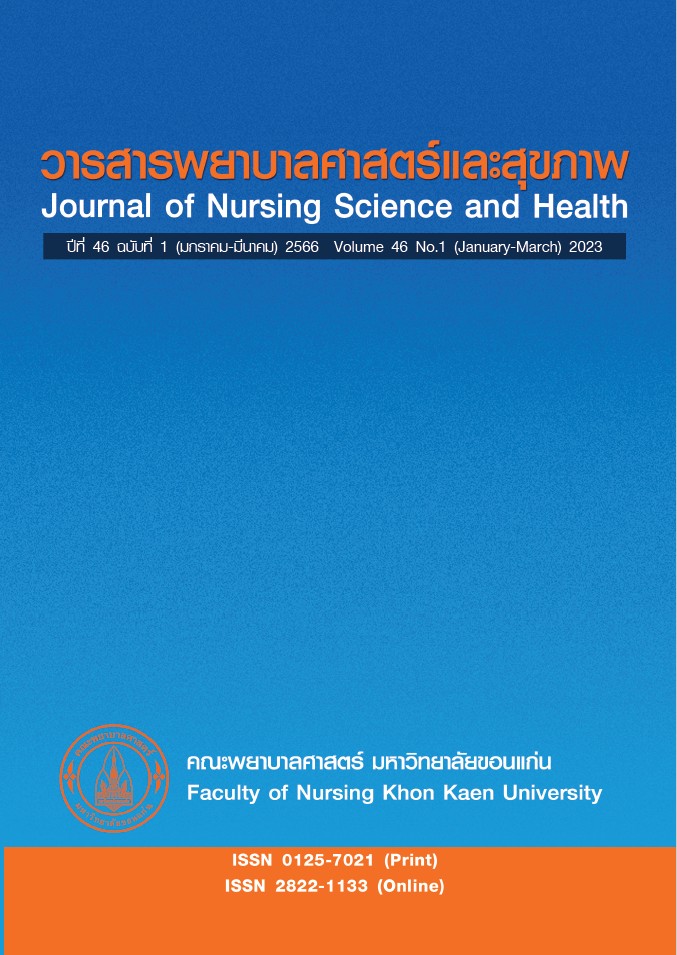ผลของโปรแกรมการดูแลความเศร้าโศกต่อการป้องกันอารมณ์เศร้าโศกผิดปกติ ในบิดามารดาที่สูญเสียบุตรจากการเจ็บป่วย
คำสำคัญ:
การดูแลผู้ป่วยเด็กแบบประคับประคอง , ความเศร้าโศกจากการสูญเสียบุคคลอันเป็นที่รัก , บิดามารดาที่สูญเสียบุตรบทคัดย่อ
การเสียชีวิตของเด็กที่เกิดจากการเจ็บป่วยมีผลกระทบทำให้เกิดความเศร้าโศกของบิดามารดาและบุคคลในครอบครัว จากการทบทวนวรรณกรรมพบว่าบิดามารดาที่สูญเสียบุตรมีความเสี่ยงต่อการเกิดความเศร้าโศกผิดปกติ และส่งผลกระทบในหลายมิติ การศึกษานี้มีวัตถุประสงค์เพื่อศึกษาผลของโปรแกรมการดูแลความเศร้าโศกต่อการป้องกันอารมณ์เศร้าโศกผิดปกติในบิดามารดาที่สูญเสียบุตรจากการเจ็บป่วย รูปแบบการวิจัยเป็นการวิจัยกึ่งทดลองที่มีการทดสอบหลังการทดลองและมีกลุ่มควบคุม กลุ่มตัวอย่างคัดเลือกแบบเจาะจงตามคุณสมบัติที่กำหนด จำนวน 28 ราย แบ่งเป็นกลุ่มควบคุมและกลุ่มทดลองกลุ่มละ 14 ราย โดยกลุ่มควบคุมได้รับการพยาบาลตามมาตรฐาน กลุ่มทดลองจะได้รับโปรแกรมการดูแลความเศร้าโศกในบิดามารดาที่สูญเสียบุตรจากการเจ็บป่วย พัฒนาโปรแกรมภายใต้กรอบแนวคิดความเศร้าโศก 5 ระยะของ Kubler-Ross และทฤษฎีความผูกพันต่อเนื่อง และโมเดลการให้ความรู้ ชี้แนะและสนับสนุน การดูแลความเศร้าโศก จำนวน 5 ครั้งๆละ 30 นาที ประเมินผลลัพธ์หลังการทดลองหลังบุตรเสียชีวิต 6 เดือน โดยใช้แบบประเมินอารมณ์เศร้าโศกผิดปกติจากการสูญเสียฉบับภาษาไทย วิเคราะห์ข้อมูลโดยเปรียบเทียบความแตกต่างของคะแนนอารมณ์เศร้าโศกระหว่างกลุ่มทดลองและกลุ่มควบคุมโดยใช้สถิติ Mann-Whitney U test
ผลการวิจัยพบว่า ค่ามัธยฐานของคะแนนอารมณ์เศร้าโศกในกลุ่มทดลองน้อยกว่าค่ามัธยฐานของคะแนนในกลุ่มควบคุมอย่างมีนัยสำคัญทางสถิติ โดยมีค่ามัธยฐานเป็น 6 และ 23 คะแนนตามลำดับ (Mann-Whitney U Test=32.5, p-value<.05) ผลการศึกษาชี้ให้เห็นว่าโปรแกรมการดูแลความเศร้าโศกมีประสิทธิภาพต่อการป้องกันอารมณ์เศร้าโศกผิดปกติในบิดามารดาที่สูญเสียบุตรจากการเจ็บป่วย การศึกษาในอนาคตควรมีการวิจัยเกี่ยวกับประสิทธิผลของโปรแกรมการดูแลความเศร้าโศกต่อการป้องกันอารมณ์เศร้าโศกผิดปกติในรูปแบบออนไลน์อื่น ๆ และในกลุ่มประชากรกลุ่มอื่น
เอกสารอ้างอิง
Medical record and statistic Srinagarind Hospital, A faculty of Medicine, Khon Kaen University. Statistic of Srinagarind patients 2017-2019.
Rosenberg AR, Baker KS, Syrjala K, Wolfe J. Systematic review of psychosocial morbidities among bereaved parents of children with cancer. Pediatr Blood Cancer 2012 ;58(4):503–12.
Daroonratsamee S, Mesukko J, Niyomkar S. Anticipatory grief and coping among parents with children transitioning into palliative care in critical care units. J Nursing 2020; 47(3):14-26. (in Thai)
Lichtenthal WG, Corner GW, Sweeney CR, Wiener L, Roberts KE, Baser RE, et al. Mental health dervices for parents who lost a child to cancer: If we build them, will they come?. J Clin Oncol 2015;33(20):2246–53.
Youngblut JM, Brooten D, Cantwell GP, del Moral T, Totapally B. Parent health and functioning 13 months after infant or child NICU/PICU death. Pediatrics 2013;132(5):e1295–301.
Hawthorne DM, Youngblut JM, Brooten D. Parent spirituality, grief, and mental health at 1 and 3 months after their infant’s/child’s death in an intensive care unit. J Pediatr Nurs 2016;31(1):73–80.
Gunavaddho P, Mookdee S. Effects of grief reducing program for the bereaved people using Buddhist practices combined with Buddhist psychological counseling. J Psychiatr Assoc Thailand 2011;56(4):403-12. (in Thai)
Punaglom N, Donprapeng B. Development of parents care model with grief from losing a child: Evaluating the impact of using model. JNSH 2018;41(1):105-16. Available from: https://he01.tci-thaijo.org/index.php/nah/article/view/104367. (in Thai)
Yathongchai S, Tangvoraphonkchai J. The grief of parents who lost a child from illness. Jounal of Nursing Science & Health 2019;42(2):44-52. (in Thai)
Dias N, Brandon D, Haase JE, Tanabe P. Bereaved parents’ health status during the first 6 months after their child’s death. Am J Hosp Palliat Care 2018;35(6):829–39.
Donovan LA, Wakefield CE, Russell V, Cohn RJ. Hospital-based bereavement services following the death of a child: A mixed study review. Palliat Med 2015;29(3):193–210.
Kentish-Barnes N, Chevret S, Azoulay E. Impact of the condolence letter on the experience of bereaved families after a death in intensive care: Study protocol for a randomized controlled trial. Trials 2016;17(1):102.
GRPCC Clinical practice group. Bereavement risk screening and management guidelines. [cited 2022 Aug 9]. Available from: http://www.grpcc.com. au/wp content/uploads/2018/06/GRPCCBereavement-Screening-and-ManagementGuideline-June-2016.pdf.
Thangjittiporn T. Bereavement care. [Internet]. 2020 Mar 12 [cited 2020 Aug 14];19. Available from: https://www.dms.go.th/backend/Content/Content_File/Old_Content/ dmsplanv_2/publish/publish12072017020755.pdf
Thongkhamcharoen R, Bereavement care in family practice and primary Care. PCFM 2018;1(1):17-30. (in Thai)
Morris SE, Dole OR, Joselow M, Duncan J, Renaud K, Branowicki P, et al. The development of a hospital-wide bereavement program: Ensuring bereavement care for all families of pediatric patients. J Pediatr Health Care 2017;31(1):88–95.
ADMIN. William worden’s four tasks of grief [Internet]. The therapy centre. 2019 [cited 2019 Oct 24]. Available from: https://thetherapycentre.ie/william-wordens-four-tasks-of-grief/
Lemeshow S, Hosmer DW, Klar J, Lwanga SK. Adequacy of sample size in health studies. New York: John Wiley & Sons; 1990.
Jirawatkul A. Statistic for health science research. Bangkok: Wittayaphat; 2015. (in Thai)
October T, Dryden-Palmer K, Copnell B, Meert KL. Caring for parents after the death of a child. Pediatr Crit Care Med 2018;19(8S Suppl 2):S61-8.
Snaman JM, Kaye EC, Levine DR, Cochran B, Wilcox R, Sparrow CK, et al. Empowering bereaved parents through the development of a comprehensive bereavement program. J Pain Symptom Manage 2017;53(4):767–75.
Kochen EM, Jenken F, Boelen PA, Deben LMA, Fahner JC, van den Hoogen A, et al. When a child dies: A systematic review of well-defined parent-focused bereavement interventions and their alignment with grief- and loss theories. BMC Palliat Care [Internet]. 2020 Mar 12 [cited 2020 Aug 14];19. Available from: https://www.ncbi.nlm. nih.gov/pmc/articles/PMC7068872/
Khunpinit K, Chaiviboontham S, Pokpalagon P.Association between the quality of palliative care and grief of bereaved families. J Hlth Sci Res 2020;14(3):24-35. (in Thai)
Yamaguchi T, Maeda I, Hatano Y, Mori M, Shima Y, Tsuneto S, et al. Effects of end-of-life discussions on the mental health of bereaved family members and quality of patient death and care. J Pain Symptom Manage 2017;54(1):17-26.
Sriarporn P, Liamtrirath S. Grief among women with perinatal loss. Nursing Journal 2014; 41(Suppl):134-42. (in Thai)
ดาวน์โหลด
เผยแพร่แล้ว
รูปแบบการอ้างอิง
ฉบับ
ประเภทบทความ
สัญญาอนุญาต
ลิขสิทธิ์ (c) 2023 วารสารพยาบาลศาสตร์และสุขภาพ

อนุญาตภายใต้เงื่อนไข Creative Commons Attribution-NonCommercial-NoDerivatives 4.0 International License.
วารสารพยาบาลศาสตร์และสุขภาพเป็นเจ้าของลิขสิทธิ์ในการเผยแพร่ผลงานที่ตีพิมพ์ห้ามผู้ใดนำบทความที่ได้รับการตีพิมพ์ในวารสารพยาบาลศาสตร์และสุขภาพไปเผยแพร่ในลักษณะต่าง ๆ ดังนี้ การนำบทความไปเผยแพร่ออนไลน์ การถ่ายเอกสารบทความเพื่อกิจกรรมที่ไม่ใช่การเรียนการสอน การส่งบทความไปตีพิมพ์เผยแพร่ที่อื่น ยกเว้นเสียแต่ได้รับอนุญาตจากวารสารพยาบาลศาสตร์และสุขภาพ



